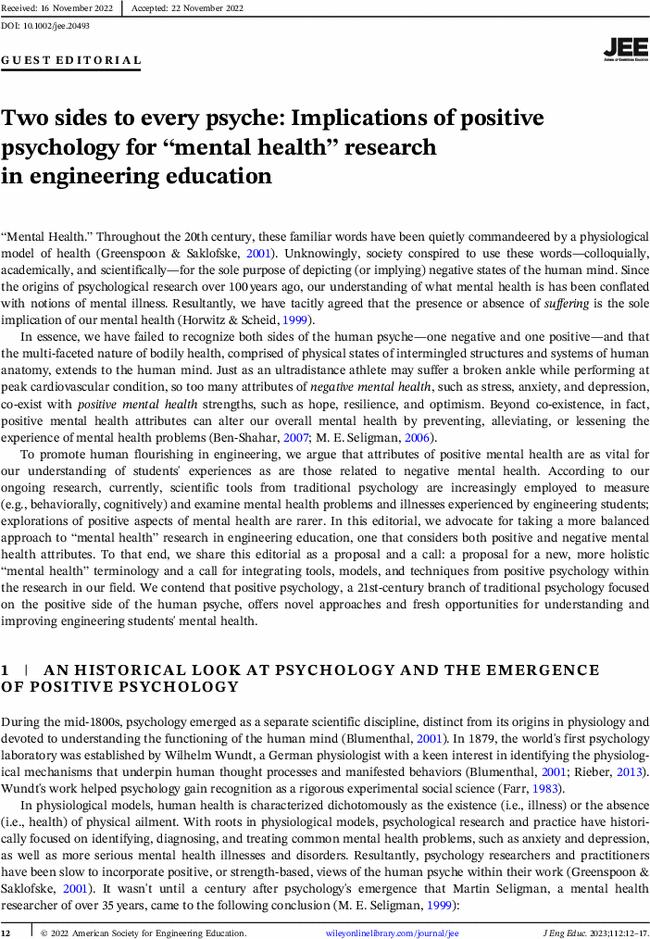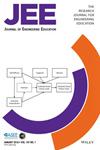Two sides to every psyche: Implications of positive psychology for “mental health” research in engineering education
IF 3.9
2区 工程技术
Q1 EDUCATION & EDUCATIONAL RESEARCH
引用次数: 1
Abstract
“Mental Health.” Throughout the 20th century, these familiar words have been quietly commandeered by a physiological model of health (Greenspoon & Saklofske, 2001). Unknowingly, society conspired to use these words—colloquially, academically, and scientifically—for the sole purpose of depicting (or implying) negative states of the human mind. Since the origins of psychological research over 100 years ago, our understanding of what mental health is has been conflated with notions of mental illness. Resultantly, we have tacitly agreed that the presence or absence of suffering is the sole implication of our mental health (Horwitz & Scheid, 1999). In essence, we have failed to recognize both sides of the human psyche—one negative and one positive—and that the multi-faceted nature of bodily health, comprised of physical states of intermingled structures and systems of human anatomy, extends to the human mind. Just as an ultradistance athlete may suffer a broken ankle while performing at peak cardiovascular condition, so too many attributes of negative mental health, such as stress, anxiety, and depression, co-exist with positive mental health strengths, such as hope, resilience, and optimism. Beyond co-existence, in fact, positive mental health attributes can alter our overall mental health by preventing, alleviating, or lessening the experience of mental health problems (Ben-Shahar, 2007; M. E. Seligman, 2006). To promote human flourishing in engineering, we argue that attributes of positive mental health are as vital for our understanding of students' experiences as are those related to negative mental health. According to our ongoing research, currently, scientific tools from traditional psychology are increasingly employed to measure (e.g., behaviorally, cognitively) and examine mental health problems and illnesses experienced by engineering students; explorations of positive aspects of mental health are rarer. In this editorial, we advocate for taking a more balanced approach to “mental health” research in engineering education, one that considers both positive and negative mental health attributes. To that end, we share this editorial as a proposal and a call: a proposal for a new, more holistic “mental health” terminology and a call for integrating tools, models, and techniques from positive psychology within the research in our field. We contend that positive psychology, a 21st-century branch of traditional psychology focused on the positive side of the human psyche, offers novel approaches and fresh opportunities for understanding and improving engineering students' mental health.

每个心理的两面性:积极心理学对工程教育“心理健康”研究的启示
本文章由计算机程序翻译,如有差异,请以英文原文为准。
求助全文
约1分钟内获得全文
求助全文
来源期刊

Journal of Engineering Education
工程技术-工程:综合
CiteScore
12.20
自引率
11.80%
发文量
47
审稿时长
>12 weeks
期刊介绍:
The Journal of Engineering Education (JEE) serves to cultivate, disseminate, and archive scholarly research in engineering education.
 求助内容:
求助内容: 应助结果提醒方式:
应助结果提醒方式:


